2019年中考英语时态知识点:常见的主将从现的四种情况
中考时态知识点归纳
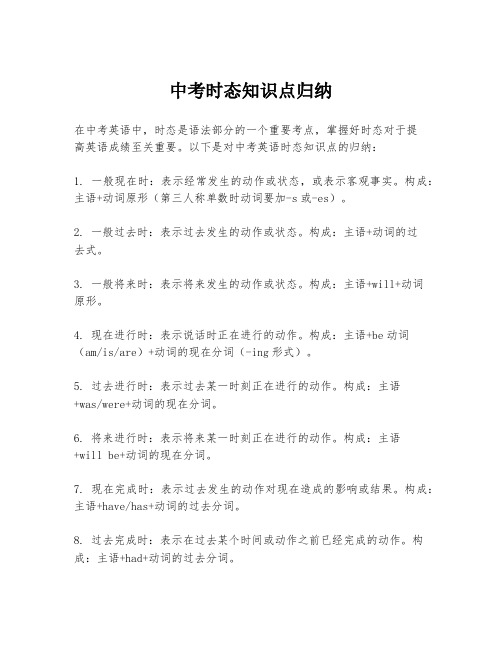
中考时态知识点归纳在中考英语中,时态是语法部分的一个重要考点,掌握好时态对于提高英语成绩至关重要。
以下是对中考英语时态知识点的归纳:1. 一般现在时:表示经常发生的动作或状态,或表示客观事实。
构成:主语+动词原形(第三人称单数时动词要加-s或-es)。
2. 一般过去时:表示过去发生的动作或状态。
构成:主语+动词的过去式。
3. 一般将来时:表示将来发生的动作或状态。
构成:主语+will+动词原形。
4. 现在进行时:表示说话时正在进行的动作。
构成:主语+be动词(am/is/are)+动词的现在分词(-ing形式)。
5. 过去进行时:表示过去某一时刻正在进行的动作。
构成:主语+was/were+动词的现在分词。
6. 将来进行时:表示将来某一时刻正在进行的动作。
构成:主语+will be+动词的现在分词。
7. 现在完成时:表示过去发生的动作对现在造成的影响或结果。
构成:主语+have/has+动词的过去分词。
8. 过去完成时:表示在过去某个时间或动作之前已经完成的动作。
构成:主语+had+动词的过去分词。
9. 将来完成时:表示将来某个时间之前已经完成的动作。
构成:主语+will have+动词的过去分词。
10. 现在完成进行时:表示从过去某一时间开始,一直持续到现在,并且可能还要继续下去的动作。
构成:主语+have/has been+动词的现在分词。
11. 过去完成进行时:表示在过去某一时间之前开始,一直持续到过去某一时间的动作。
构成:主语+had been+动词的现在分词。
12. 被动语态:表示动作的承受者而非执行者。
被动语态的构成根据时态不同而变化,一般形式为:be动词的各种时态形式+动词的过去分词。
掌握这些时态的构成和用法,对于理解和运用英语时态至关重要。
在复习时,可以通过做练习题、阅读例句和进行实际对话来加深理解。
同时,注意时态之间的转换和使用场合,以确保在中考中能够准确无误地使用各种时态。
结束语:通过上述的归纳,希望同学们能够对中考英语中的时态有一个清晰的认识和掌握,为中考取得优异成绩打下坚实的基础。
初中主将从现的用法及归纳

初中主将从现的用法及归纳初中主将从现(Simple Present)是英语语法中主要时态之一。
它用来表达现在的状态、习惯、经常性的行为或真理等。
其基本结构为主语+谓语。
1. 表示实际发生的事情或客观存在的状态例句:I live in New York.(我住在纽约。
)He speaks Chinese fluently.(他擅长讲中文。
)2. 表示经常性的动作或习惯例句:She eats breakfast at 7 every morning.(她每天早上7点吃早餐。
)They always go jogging on weekends.(他们每个周末都去慢跑。
)3. 表示含义广泛的真理、事实或规律例句:The earth orbits around the sun.(地球绕着太阳运转。
)Water boils at 100 degrees Celsius.(水在100摄氏度沸腾。
)4. 表示主观感受或态度例句:I love watching movies.(我喜欢看电影。
)She hates getting up early.(她讨厌早起。
)5. 表示命令、建议、要求等意愿例句:Don’t forget your keys.(别忘了你的钥匙。
)Please open the window.(请打开窗户。
)6. 表示现在进行时例句:I am reading a book now.(我正在看书。
)They are studying for the test.(他们正在准备考试。
)初中主将从现的用法总结如下:1. 表示现实、事实或状态2. 表示经常性的行为和习惯3. 表示真理、事实或规律4. 表示主观感受和态度5. 表示命令、建议、要求等意愿6. 表示现在进行时初中主将从现的否定形式一般在谓语前面加上“don’t”或“doesn’t”,疑问形式则将“do”或“does”提到主语前面。
其特殊疑问句可通过疑问词引导:what, when, where, why, how等。
主将从现常见的有以下六种情况

常见的有以下六种情况:一、如果主句是将来时或表示将来含义时,那么条件和时间状语从句多用一般现在时如:When I grow up, I will be a nurse and look after patients/ I want to be a nurse and look after patients.我长大后要当一名护士,照顾病人。
二、如果主句是祈使句,那么从句通常要用一般现在时如:Don’t laugh at me when I make a mistake.我犯错误的时候不要笑话我。
三、如果主句是含有情态动词的一般现在时,根据需要从句多用一般现在时如:You should be quiet when you are in the reading room在阅览室时应保持安静。
四、如果if的条件状语从句遇到变换间接和直接时, 祈使句应用not to....如; She said not to close the window常见的时间状语从句的连词有:as soon as,when,while ,as,until等五、主将从现说的是在含有时间状语从句和条件状语从句的主从复合句中,如果主句的时态是一般将来时,那么从句要用一般现在时。
例如:I will tell him about it when he comes.If it is fine tomorrow, we will go outing.六、如果主句的时态是过去将来时,那么从句要用一般过去时。
例如:He said that he would have another try if he had the chance.I knew he could help me if he was free the next day.主要标志有:if 、unless 、until、when 、as soon as等If引导的条件句(if翻译成"如果"的时候)Ⅰ.(if 从句) 主句v./ v.三单will+v.Ⅱ. if+sb+v./ v.三单can+v.某事很可能发生,条件是可能存在的,主句中某种情况发生的概率也是很高的。
主将从现 知识讲解 “主将从现”适用于什么样的从句中

主将从现知识讲解“主将从现”适用于什么样的从句中所谓的“主将从现”第一层次,即“主句用将来时(现在将来时和过去将来时),从句用一般时(一般现在时和一般过去时)”,这一层次也可以称作“初中层次”。
第二层次:“主将”中将来时有将来进行时,将来完成时,将来完成进行时,而“从现”中相应的时态也可能是现在进行时,现在完成时,现在完成进行时。
例如:If the snow has completely stopped, we will be playing with snow on the playground.如果雪能够完全停下来,我们将正在操场上玩雪呢!If it is snowing, we will have been walking in the snow for more than two hours.如果天一直在下雪,我们将在雪地里走了两个多小时了。
另外,引导条件状语从句的连接词(connector)还可以是unless, so long as, in case, on condition that, supposing that, provided that 等。
if引导条件状语从句的两种用法:第一种用法:当某事发生的可能性较大时,这种情况,有个十三字口诀:“主将从现,主过将从过,主现从现”。
即主句是一般将来时,从句用一般现在时;主句用过去将来时,从句用一般过去时;当主句中有can/can’t的话,则从句用一般现在时。
例如:If he has time, he will come tomorrow.If she finishes early, she can come back early.If you don’t do homework, the teacher will scold you.第二种用法:1.if从句还表示不可实现的条件或根本不可能存在的条件,也就是一种虚拟的条件或假设,从句多用一般过去时或过去完成时。
2019中考英语必考八大时态总结

2019中考英语必考八大时态总结在初中阶段,我们学习到的常用的时态有8种:一般现在时,一般过去时,现在进行时,过去进行时,现在完成时,过去完成时,一般将来时和过去将来时。
一下将对初中阶段英语时态知识要点、考点进行归纳总结,希望能对大家复习备考与解题有所帮助。
.1 一般现在时的用法1) 经常性或习惯性的动作,常与表示频度的时间状语连用。
时间状语:every…,sometimes,ofen,always,usually, twice a week, at…, on SundayI leave home for school at 7 every morning. He watches Tv once a week .2) 客观真理,客观存在,科学事实。
The earth moves around the sun. Shanghai lies in the east of China.3) 表示格言或警句中。
Pride goes before a fall. 骄者必败。
注意:此用法如果出现在宾语从句中,即使主句是过去时,从句谓语也要用一般现在时。
例:Columbus proved that the earth is round..4) 现在时刻的状态、能力、性格、个性。
I don't want so much. Ann Wang writes good English but does not speak well.比较:Now I put the sugar in the cup. I am doing my homework now.第一句用一般现在时,用于操作演示或指导说明的示范性动作,表示言行的瞬间动作。
再如:Now watch me, I switch on the current and stand back. 第二句中的now是进行时的标志,表示正在进行的动作的客观状况,所以后句用一般现在时。
主将从现的用法及归纳
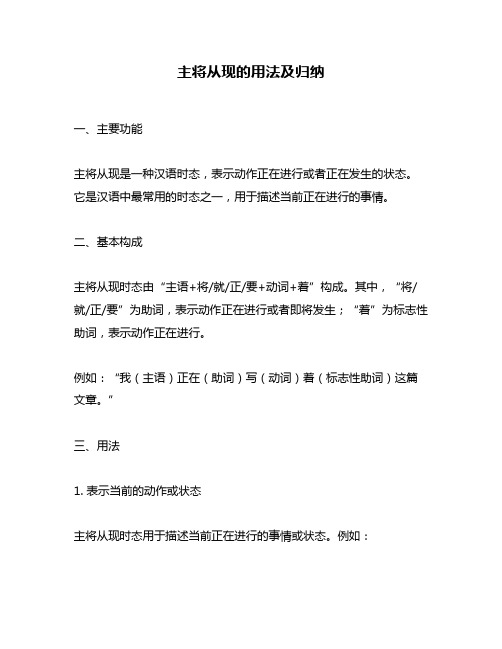
主将从现的用法及归纳一、主要功能主将从现是一种汉语时态,表示动作正在进行或者正在发生的状态。
它是汉语中最常用的时态之一,用于描述当前正在进行的事情。
二、基本构成主将从现时态由“主语+将/就/正/要+动词+着”构成。
其中,“将/就/正/要”为助词,表示动作正在进行或者即将发生;“着”为标志性助词,表示动作正在进行。
例如:“我(主语)正在(助词)写(动词)着(标志性助词)这篇文章。
”三、用法1. 表示当前的动作或状态主将从现时态用于描述当前正在进行的事情或状态。
例如:- 我们现在正在看电影。
(表示目前正在看电影)- 他们正在讨论这个问题。
(表示目前正在讨论)- 我们正坐在公园里享受阳光。
(表示目前正在公园里享受阳光)2. 表示即将发生的动作主将从现时态还可以用于表达即将发生的事情。
例如:- 我们明天要去旅游。
(表示明天计划要去旅游)- 他马上就要来了。
(表示他即将到来)- 我们马上就要出发了。
(表示我们即将出发)3. 表示动作的持续性主将从现时态还可以用于表示动作的持续性。
例如:- 我们一直在等你。
(表示等待的动作一直持续)- 他正在学习英语。
(表示学习英语的动作正在进行)- 我们正走着路。
(表示走路的动作正在进行)4. 表示动作的结果主将从现时态还可以用于表示动作的结果。
例如:- 他努力学习着,终于考上了大学。
(表示努力学习最终取得了成功)- 我们一直在努力工作着,终于实现了我们的目标。
(表示努力工作最终取得了成功)四、注意事项1. 主将从现时态只能用于描述正在进行或者即将发生的事情,不能用于描述已经完成或者过去发生的事情。
2. 主将从现时态中,“将/就/正/要”为助词,不能省略。
3. 主将从现时态中,“着”为标志性助词,如果没有特殊需要,不宜过多使用。
五、总结主将从现是汉语中最常用的时态之一,用于描述当前正在进行或者即将发生的事情。
它由“主语+将/就/正/要+动词+着”构成,常用于表达动作的进行、即将发生、持续性和结果。
主将从现——精选推荐

主将从现主将从现主将从现是指在时间状语从句和条件状语从句中,如果主句是一般将来时,从句用一般现在时替代一般将来时。
现在时替代一般将来时。
常见的有以下四种情况:常见的有以下四种情况:一、一、 条件状语从句的主句是一般将来时,那么从句常常用一般现在时条件状语从句的主句是一般将来时,那么从句常常用一般现在时如When I grow up, I ’ll be a nurse and look a er pa ents 我长大后要当一名护士,照顾病人我长大后要当一名护士,照顾病人 二、二、 如果主句是祈使句,那么从句通常要用一般现在时如果主句是祈使句,那么从句通常要用一般现在时如:Don ’t laugh at me when I make a mistake. 我犯错误的时候不要笑话我。
我犯错误的时候不要笑话我。
三、三、 如果主句是含有情态动词的一般现在时,根据需要从句多用一般现在时如果主句是含有情态动词的一般现在时,根据需要从句多用一般现在时如:You should be quiet when you are in the reading room 在阅览室时应保持安静在阅览室时应保持安静 四. 如果if 的条件状语从句遇到变换间接和直接时的条件状语从句遇到变换间接和直接时 , 祈使句应用not to.... 如; She said not to close the window 常见的时间状语从句的连词有:as soon as, when, while ,as ,un l 等主将从现说的是在含有时间状语从句和条件状语从句的主从复合句中,如果主句的时态是一般将来时,那么从句要用一般现在时。
一般将来时,那么从句要用一般现在时。
例如:例如: I will tell him about it when he comes. If it is fine tomorrow, we will go ou ng. 任务I. 请用正确的形式填空。
如何理解时态呼应中的“主将从现”

如何理解时态呼应中的“主将从现”有朋友在本站“答疑中心”询问:如何理解时态呼应中的“主将从现”。
其实,英语语法书上没有“主将从现”这一语法术语,只是我们的英语教师在教学上为方便学生(主要是初学者)的理解和记忆,特地创造了这个术语。
它的意思是:当主句是一般将来时时,其相应的时间状语从句、条件状语从句、让步状语从句等习惯上要用一般现在时替代将来意义,而不能直接使用一般将来时。
一、通常情况1. “主将从现”见于时间状语从句As soon as I get through with my work I’ll join you. 我工作一做完就来找你们。
As soon as my divorce goes through, we’ll get married. 一俟我的离婚申请获准,我们就结婚。
Before they drive any of the buses, they will have to pass a special test. 然而在驾驶公共汽车前,他们必须通过专门测验。
My mother will be very angry with me when she finds out where I’ve been. 我母亲要是知道我到过那地方一定会大怒。
We’ll pay you half up front and the other half when you’ve finished the job. 我们先付给你一半钱,剩下的一半等你干完了再付。
2. “主将从现”见于条件状语从句If (it is) necessary I will come at 6. 如有必要,我6点钟来。
If today is Wednesday, the day after tomorrow will be Friday. 今天要是星期三,后天就是星期五。
If you train hard, you’ll make a good footballer. 你要刻苦训练就能成为优秀的足球运动员。
中考英语时态总结
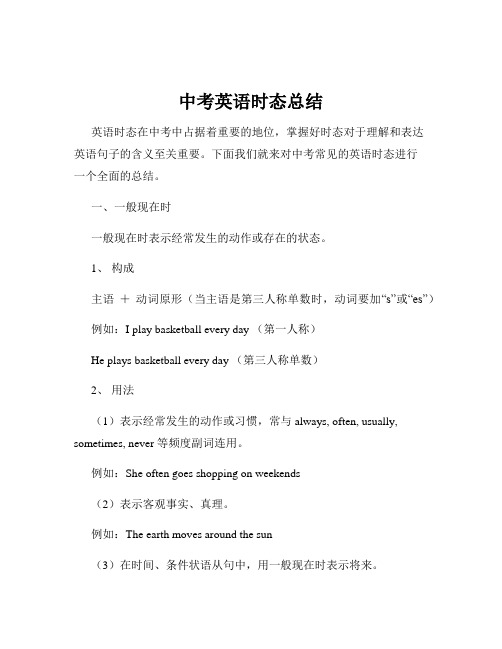
中考英语时态总结英语时态在中考中占据着重要的地位,掌握好时态对于理解和表达英语句子的含义至关重要。
下面我们就来对中考常见的英语时态进行一个全面的总结。
一、一般现在时一般现在时表示经常发生的动作或存在的状态。
1、构成主语+动词原形(当主语是第三人称单数时,动词要加“s”或“es”)例如:I play basketball every day (第一人称)He plays basketball every day (第三人称单数)2、用法(1)表示经常发生的动作或习惯,常与 always, often, usually, sometimes, never 等频度副词连用。
例如:She often goes shopping on weekends(2)表示客观事实、真理。
例如:The earth moves around the sun(3)在时间、条件状语从句中,用一般现在时表示将来。
例如:If it rains tomorrow, we won't go for a picnic 二、一般过去时一般过去时表示过去发生的动作或存在的状态。
1、构成主语+动词的过去式例如:I went to Beijing last year2、用法(1)表示过去某个时间发生的动作或存在的状态。
例如:He was at home yesterday(2)表示过去经常或反复发生的动作。
例如:My father often smoked when he was young 三、一般将来时一般将来时表示将来要发生的动作或存在的状态。
1、构成(1)“will +动词原形”例如:I will visit my grandparents next week(2)“be going to +动词原形”例如:He is going to play football tomorrow2、用法(1)表示将来要发生的动作或存在的状态。
主将从现常见的有以下六种情况
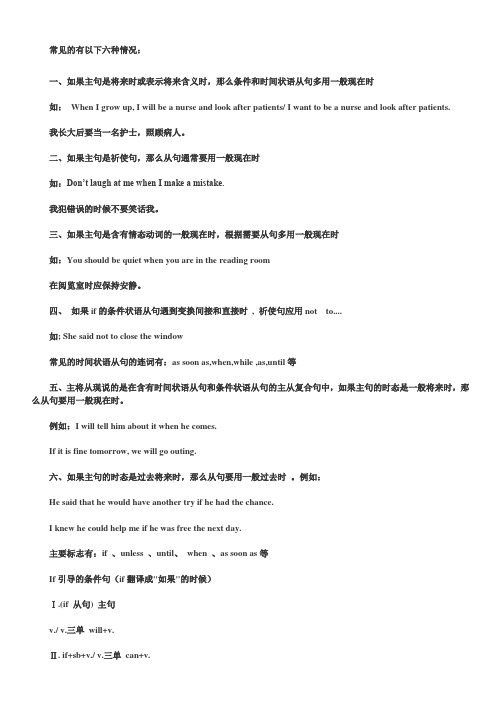
常见的有以下六种情况:一、如果主句是将来时或表示将来含义时,那么条件和时间状语从句多用一般现在时如:When I grow up, I will be a nurse and look after patients/ I want to be a nurse and look after patients.我长大后要当一名护士,照顾病人。
二、如果主句是祈使句,那么从句通常要用一般现在时如:Don’t laugh at me when I make a mistake.我犯错误的时候不要笑话我。
三、如果主句是含有情态动词的一般现在时,根据需要从句多用一般现在时如:You should be quiet when you are in the reading room在阅览室时应保持安静。
四、如果if的条件状语从句遇到变换间接和直接时, 祈使句应用not to....如; She said not to close the window常见的时间状语从句的连词有:as soon as,when,while ,as,until等五、主将从现说的是在含有时间状语从句和条件状语从句的主从复合句中,如果主句的时态是一般将来时,那么从句要用一般现在时。
例如:I will tell him about it when he comes.If it is fine tomorrow, we will go outing.六、如果主句的时态是过去将来时,那么从句要用一般过去时。
例如:He said that he would have another try if he had the chance.I knew he could help me if he was free the next day.主要标志有:if 、unless 、until、when 、as soon as等If引导的条件句(if翻译成"如果"的时候)Ⅰ.(if 从句) 主句v./ v.三单will+v.Ⅱ. if+sb+v./ v.三单can+v.某事很可能发生,条件是可能存在的,主句中某种情况发生的概率也是很高的。
英语主将从现的用法
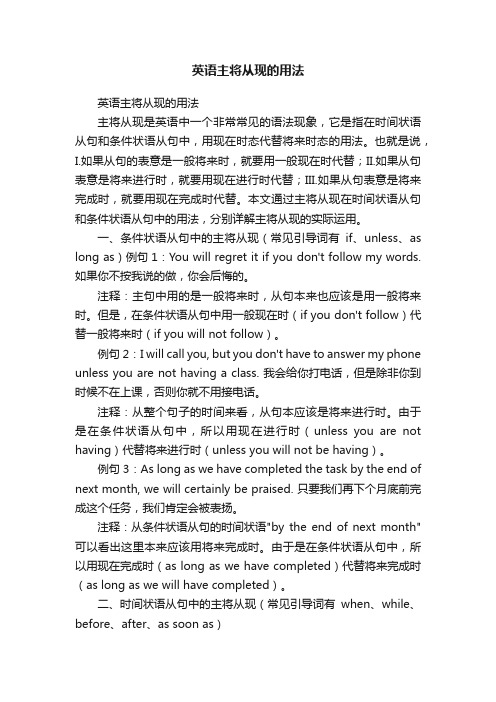
英语主将从现的用法英语主将从现的用法主将从现是英语中一个非常常见的语法现象,它是指在时间状语从句和条件状语从句中,用现在时态代替将来时态的用法。
也就是说,I.如果从句的表意是一般将来时,就要用一般现在时代替;II.如果从句表意是将来进行时,就要用现在进行时代替;III.如果从句表意是将来完成时,就要用现在完成时代替。
本文通过主将从现在时间状语从句和条件状语从句中的用法,分别详解主将从现的实际运用。
一、条件状语从句中的主将从现(常见引导词有if、unless、as long as)例句1:You will regret it if you don't follow my words. 如果你不按我说的做,你会后悔的。
注释:主句中用的是一般将来时,从句本来也应该是用一般将来时。
但是,在条件状语从句中用一般现在时(if you don't follow)代替一般将来时(if you will not follow)。
例句2:I will call you, but you don't have to answer my phone unless you are not having a class. 我会给你打电话,但是除非你到时候不在上课,否则你就不用接电话。
注释:从整个句子的时间来看,从句本应该是将来进行时。
由于是在条件状语从句中,所以用现在进行时(unless you are not having)代替将来进行时(unless you will not be having)。
例句3:As long as we have completed the task by the end of next month, we will certainly be praised. 只要我们再下个月底前完成这个任务,我们肯定会被表扬。
注释:从条件状语从句的时间状语"by the end of next month"可以看出这里本来应该用将来完成时。
初中英语时态知识点:常见的主将从现的四种情况

Ifitisfinetomorrow,wewillgoouting.
如果主句的时态是过去将来时,那幺从句要用一般过去时。例如:
Hesaidthathewouldhaveanothertryifhehadthechance.
Iknewhecouldhelpmeifhewasfreethenextday.
在阅览室时应保持安静。
四、如果if的条件状语从句遇到变换间接和直接时,祈使句应用
notto....
如;Shesaidnottoclosethewindow
常见的时间状语从句的连词有:assoonas,when,while,as,until等
主将从现说的是在含有时间状语从句和条件状语从句的主从复合句
中,如果主句的时态是一般将来时,那幺从句要用一般现在时。例如:
主要标志有:if、unless、until、when、assoonas
我长大后要当一名护士,照顾病人。
二、如果主句是祈使句,那幺从句通常要用一般现在时
如:DontlaughatmewhenImakeamistake.
我犯错误的时候不要笑话我。
三、如果主句是含有情态动词的一般现在时,根据需要从句多用一般
现在时
如:Youshouldbequietwhenyouareinthereadingroom
初中英语时态知识点:常见的主将从现的四种情况
主将从现
主将从现是指在时间状语从句和条件状语从句和让步状语从句中,如
果主句是一般将来时,从句用一般现在时替代一般将来时。主将从现
常见的有以下四种情况:
一、时间状语从句的主句是一般将来时,那幺从句常常用一般现在
英语主将从现的用法

英语主将从现的用法主将从现是英语中一个非常常见的语法现象,它是指在时间状语从句和条件状语从句中,用现在时态代替将来时态的用法。
也就是说,I.如果从句的表意是一般将来时,就要用一般现在时代替;II.如果从句表意是将来进行时,就要用现在进行时代替;III.如果从句表意是将来完成时,就要用现在完成时代替。
本文通过主将从现在时间状语从句和条件状语从句中的用法,分别详解主将从现的实际运用。
一、条件状语从句中的主将从现(常见引导词有if、unless、as long as)例句1:You will regret it if you don't follow my words. 如果你不按我说的做,你会后悔的。
注释:主句中用的是一般将来时,从句本来也应该是用一般将来时。
但是,在条件状语从句中用一般现在时(if you don't follow)代替一般将来时(if you will not follow)。
例句2:I will call you, but you don't have to answer my phone unless you are not having a class. 我会给你打电话,但是除非你到时候不在上课,否则你就不用接电话。
注释:从整个句子的时间来看,从句本应该是将来进行时。
由于是在条件状语从句中,所以用现在进行时(unless you are not having)代替将来进行时(unless you will not be having)。
例句3:As long as we have completed the task by the end of next month, we will certainly be praised. 只要我们再下个月底前完成这个任务,我们肯定会被表扬。
注释:从条件状语从句的时间状语"by the end of next month"可以看出这里本来应该用将来完成时。
主将从现的三种句型

主将从现的三种句型在英语学习中,主将从现是一种非常常见的句型。
它用来表示将来的动作或情况,通常被用于表示计划、意图、预测、承诺以及请求等。
主将从现句型以“主语+will+动词原形”或“主语+be+动词-ing”形式出现。
本文将介绍主将从现句型的三种不同用法,帮助读者更好地理解和运用这一句型。
第一种用法是表示计划和意图。
在这种情况下,主将从现句型常常被用来表达计划或打算要做的事情。
例如:“I will go to the gym tomorrow.”(我明天要去健身房。
)这个句子表达了说话人将要在明天去健身房的意图。
另一个例子是:“She will start a new job next month.”(她下个月要开始一份新工作。
)这个句子表达了她计划下个月开始一份新工作的意图。
第二种用法是表示预测和推测。
主将从现句型常常被用来表达对未来的预测或推测。
例如:“It will rain tomorrow.”(明天会下雨。
)这个句子表达了说话人对明天天气的预测。
另一个例子是:“He will probably win the competition.”(他很可能会赢得比赛。
)这个句子表达了说话人对他赢得比赛的推测。
第三种用法是表示承诺和请求。
主将从现句型常常被用来表达承诺或请求的意思。
例如:“I will help you with your homework.”(我会帮你做作业。
)这个句子表达了说话人对帮助别人做作业的承诺。
另一个例子是:“Will you please open the window?”(请你打开窗户好吗?)这个句子表达了一种礼貌地请求别人打开窗户的意思。
需要注意的是,主将从现句型并不适用于所有情况。
在某些特定的情况下,如已经计划好的事情、日常习惯以及无法改变的事实等,我们需要使用其他句型来表达。
此外,主将从现句型也可以和其他句型结合使用,以增强语义的表达。
例如,“I will be studying at home tonight.”(我今晚要在家学习。
2019年中考英语八大时态语法讲解

2019年中考英语八大时态语法讲解2019年中考英语八大时态语法讲解(绝对精品文档,价值很高,值得下载打印背诵) 一般现在时概念:1. 表示现在的状态eg:I am twelve.2. 表示经常或习惯性动作eg:he gets up at six.3. 表示主语所具备的性格或能力eg:he likes English.4. 表示客观事实真理eg:the earth goes around the sun.标志性词语:Often,usually,sometimes,always,never,on Sunday,every year/month/dayEg: she often goes to school on foot.He goes to park once a week.行为动词第三人称单数加-s 的形式1. 一般动词直接加-s2. 以辅音字母+y,把 y 改 i 再加 es,3. 以 s,x,sh,ch 结尾的动词加-es4. 以 o 结尾的动词一般加-es5. 特殊情况:have—has基本结构:Be 型:肯定式:主语+be 动词(am/is/are)+其他表状态(there be+n)否定式:主语+be 动词(am/is/are)+not+其他疑问式:将 be 动词提前放句首,第三人称动词变原形(一二人称互换,第三人称不变)特殊式:特殊疑问词+be+主语实义动词型:肯定式:主语+行为动词(注意人称三单形式)+其他否定式:主语+do n’t/doesn’t+行为动词+其他疑问式:一般式:Do/Does+主语+行为动词原形+其他特殊式:特殊疑问词+do/does+主语+谓语小试牛刀:写出下列动词的第三人称形式wash:match:study:finish:go:snow:carry:stop:see:drive:let:teach:keep:join:put:do:drink:toy:play: begin:take:run:fly:talk:stay:look:watch:think:carry:fix:单项选择1. There an English film at the cinema now.A:is B:are C:am D:be2. The picture nice.A:look B:looks C:looked D:be look3. He sits down and soon asleep.A:fall B:falling C:falled D: falls4. The water sweet.A:drinking B:drinks C:drink D:to drink5. I up at six but Mike up at sevenA:get,gets B:get ,get C:gets,get D:getting, to get6. My father for eight hours every day.A:working B:works C:work D:to work7. Uncle Wang never English, because he know how to say it.A:speak,doesn’t B:speak,don’t C:speaks,don’t D:speaks,doesn’t8. On Sunday my daughter watching TV and my son to play footballwith his friends.A:like,want B:likes,want C:like,wants D:likes,wants 9. Su Yangusually some clothes on Sunday.A:washed B:washs C:washes D:washing 10. Su Hai and Su Yang eight lessons this termA:have B:has C:haves D:having用所给词的正确形式填空A. We often (not play)on the playground.B.you (brush) your teeth every day.C. How many lessons your classmate (have) on Sunday.D. It (take) me two hours to finish my homework every day.E. The child often (watch) TV in the evening.F. What (do) he usually (do) after school.G. John (study) Math , Chinese ,English ,Science and Art at school.H. Mr. Wang often (go) to Shanghai.I. There (be) a football match on TV every morning.J. We (not watch)TV on Monday.句式训练Do you like to play football after school?肯定句肯定/否定回答:I have many books.否定句:一般疑问句:肯定回答:否定回答:Nancy doesn’t run fast.肯定句:I usually play football on Friday afternoon.一般疑问句:特殊疑问句:肯定/否定回答:Tom does his homework at home. 否定句:一般疑问句:特殊疑问句:Mike has two letters for him.一般疑问句:特殊疑问句:否定回答:判断正误1. Is your brother speak English?2. Does he likes going fishing?3. Jane do his homework every morning.4. He like play basketball with his friends.5. We eats dinner at six and go to bed at eleven.6. My dog runs fast.7. He speak English very well.8. What do they usually do on Saturday.9. My mother don’t have breakfast this morning.10. I like reading books on the library every day.中考真题1.Jenny! Do you know that one-third of the boys in our class the singer Zhang Shao Han?A. likeB. likesC.liking2. The sense of happiness will increase if you what you like to do.A. doB. didC. will do3. Betty will ring me up when she inBeijing.A. arriveB. arrivesC. arrivedD. willarrive4. If you your homework, you can go out to play football.5.Now my father his bike to work every day instead of driving.A. rideB. r od eC. ridesD. will ride6. This girl is rea d y t o help p eo pl e an y time. Wh e n sh e is on t h e bu s,sh e al w a y s her seat to someone in need.A. givesB. giveC. gaveD.giving概念:一般过去时表示过去某个时间収生的动作或存在的状态. Eg: I got up at seven yesterday表示过去经常収生的动作或存在的状态. Eg: he always went to school by car last term标志性词语:yesterday,last month/year/week/night,the day beforeyesterday,in the past,at that time,two days ago,just n ow……..动词过去时的变化规则:一般在词尾直接+ed play——played以 e 结尾的动词直接+d taste—— tasted末尾三个字母以“辅+元+辅”且为重读闭音节,双写末尾辅音+ed stop——stopped以辅音字母+y,改 y 为 i 再+ed study——studied不规则动词过去式:am/is: a re:do:see:sa y:give: eat:w rit e: sp en d:get:take:sp eak:drin k:g o:r un:rid e:sle ep:c o me:sin g:swim:s t and:has/ha ve:pu t:sit:rea d:结构:Be 型肯定式:主语+be 动词(was/were)+其他否定式:主语+wasn’t/weren’t+其他疑问式:Be 动词+主语+其他(一二人称互换,第三人称不变)特殊疑问句:特殊疑问词+was/were+主语+其他实义动词型肯定式:主语+动词过去式+其他否定式:主语+didn’t+动词原形+其他疑问式:Did+主语+动词原形+其他特殊疑问句:特殊疑问词+did+主语+动词原形+其他用所给单词正确形式填空◆We (enjoy) ourselves at the party last night.◆Jack (study) for the English test last Sunday.◆ you (go) to the Great Wall last year?◆What day (be) it yesterday?◆The old man (be)ill and went to see a doctor.◆We (have) a party last night.◆We (visit) the museum and went home.◆—How (be) the students? —They were very friendly.◆My mother (not do) housework yesterday. ◆—he (have) lunch at nine? —No, he did n’t.◆They (buy) a guitar yesterday.◆the cat (eat)a bird yesterday night.◆They (play)chess in the classroom last PE lesson.◆Nancy (pick)up orange on the farm last week.◆My mother (cook)a nice food last spring festival.◆I (be)at school just now.◆He (be)at the camp last week.◆The mobile phone (be)on the table yesterday evening.◆I (make)a model ship with Mike yesterday.◆What (do)you do last month.单项选择( ) 1. Lee his mobile phone at home.A. leaveB. leavesC. leavedD. left( ) 2. he a good rest? No, he didn’t.A. Do, hadB. Did, haveC. Did, hadD. Was, had( ) 3. As soon as he , he to his family.A. arrived, writesB. arrived, writtenC. arrived, wroteD. arriveds, write( ) 4. Mr. Black was late because he his way.A. lostedB. loseC. losesD. lost( ) 5. When Lee school this morning?A. did, got toB. did, get toC. did, getD. did, got( ) 6. Will you please say it again? I quite you.A. didn’t, hearB. don’t, heardC. didn’t, heardD. don’t, hear ( ) 7. you at six o’c lock yesterday?A. Do ,get upB. Did, get upD. Did, got up ( ) 8.What did you see ?A. nowB. every dayC. these daysD. just now ( ) 9.He went into the room and the door.A. lockB. lockingC. locksD. locked ( ) 10. —What you last week? —I bought a bag.A. did ,buyB. did , boughtC. do, buyD. do, bought ( ) 11. —he his lunch? —Yes, he did.A. Does ,hasB. Does, haveC. Did, haveD. Did, had ( )12.—Did the thieves into the car? —No, they .A. fell, did n’tB. fall(落下), didC. jump(跳), didn’tD. jump, did ( ) 13. -When did May come back from Hong Kong?-She from Hong Kong last Friday.A. come backB. comes backC. returned backD. came back( ) 14. she this dictionary in the bookshop nearby last week?A. Did, buyC. Did, boughtD. Does, buys ( ) 15. He to the station this morning and was for the train.A. hurry, in timeB. hurries, on timeC. hurried, in timeD. hurried, at time句型转换1. Frank read an interesting book about history. (一般疑问句)Frank an interesting book about history?2. Thomas spent RMB 10 on this book. (否定句)Thomas RMB 10 on this book.3. I didn’t have any friends. (一般疑问句)have friends?4. She watched TV after supper(划线部分提问)she after supper.5. There was some orange in the fridge.(一般疑问句)there_ orange in the fridge?改错题1. How is Jane yesterday?2. He go to school by bus last week.3. He often goes home at 6:00 last month.4. I can fly kites seven years ago.5. Did you saw him just now.6. Tom wasn’t watch TV last night.7. I didn’t my homework yesterday. 8. He wait for you three hours ago.9. Who find it just now ? 10. What did he last week?综合训练。
(完整word版)主将从现常见的有以下六种情况.docx

常见的有以下六种情况:一、如果主句是将来时或表示将来含义时,那么条件和时间状语从句多用一般现在时如:When I grow up, I will be a nurse and look after patients/ I want to be a nurse and look after patients.我长大后要当一名护士,照顾病人。
二、如果主句是祈使句,那么从句通常要用一般现在时如: Don’t laugh at me when I make a mistake.我犯错误的时候不要笑话我。
三、如果主句是含有情态动词的一般现在时,根据需要从句多用一般现在时如: You should be quiet when you are in the reading room在阅览室时应保持安静。
四、如果if的条件状语从句遇到变换间接和直接时, 祈使句应用not to....如 ; She said not to close the window常见的时间状语从句的连词有:as soon as,when,while ,as,until等五、主将从现说的是在含有时间状语从句和条件状语从句的主从复合句中,如果主句的时态是一般将来时,那么从句要用一般现在时。
例如: I will tell him about it when he comes.If it is fine tomorrow, we will go outing.六、如果主句的时态是过去将来时,那么从句要用一般过去时。
例如:He said that he would have another try if he had the chance.I knew he could help me if he was free the next day.主要标志有:if 、 unless 、 until 、 when 、 as soon as 等If 引导的条件句(if 翻译成 " 如果 " 的时候)Ⅰ .(if从句)主句v./ v. 三单will+v.Ⅱ . if+sb+v./ v. 三单can+v.某事很可能发生,条件是可能存在的,主句中某种情况发生的概率也是很高的。
主将从现常见的有以下六种情况

常见的有以下六种情况:一、如果主句是将来时或表示将来含义时,那么条件和时间状语从句多用一般现在时如:When I grow up, I will be a nurse and look after patients/ I want to be a nurse and look after patients.我长大后要当一名护士,照顾病人。
二、如果主句是祈使句,那么从句通常要用一般现在时如:Don’t laugh at me when I make a mistake.我犯错误的时候不要笑话我。
三、如果主句是含有情态动词的一般现在时,根据需要从句多用一般现在时如:You should be quiet when you are in the reading room在阅览室时应保持安静。
四、如果if的条件状语从句遇到变换间接和直接时, 祈使句应用not to....如; She said not to close the window常见的时间状语从句的连词有:as soon as,when,while ,as,until等五、主将从现说的是在含有时间状语从句和条件状语从句的主从复合句中,如果主句的时态是一般将来时,那么从句要用一般现在时。
例如:I will tell him about it when he comes.If it is fine tomorrow, we will go outing.六、如果主句的时态是过去将来时,那么从句要用一般过去时。
例如:He said that he would have another try if he had the chance.I knew he could help me if he was free the next day.主要标志有:if 、unless 、until、when 、as soon as等If引导的条件句(if翻译成"如果"的时候)Ⅰ.(if 从句) 主句v./ v.三单will+v.Ⅱ. if+sb+v./ v.三单can+v.某事很可能发生,条件是可能存在的,主句中某种情况发生的概率也是很高的。
完整版主将从现常见的有以下六种情况

常见的有以下六种情况:一、如果主句是将来时或表示将来含义时,那么条件和时间状语从句多用一般现在时如:When I grow up, I will be a nurse and look after patients/ I want to be a nurse and look after patients.我长大后要当一名护士,照顾病人.二、如果主句是祈使句,那么从句通常要用一般现在时如:Don' t laugh at me when I make a mistake.我犯错误的时候不要笑话我.三、如果主句是含有情态动词的一般现在时,根据需要从句多用一般现在时如: You should be quiet when you are in the reading room在阅览室时应保持安静.四、如果if的条件状语从句遇到变换间接和直接时,祈使句应用not to....如;She said not to close the window常见的时间状语从句的连词有:as soon as,when,while ,as,until等五、主将从现说的是在含有时间状语从句和条件状语从句的主从复合句中,如果主句的时态是一般将来时,那么从句要用一般现在时.例如:I will tell him about it when he comes.If it is fine tomorrow, we will go outing.六、如果主句的时态是过去将来时,那么从句要用一般过去时.例如:He said that he would have another try if he had the chance.I knew he could help me if he was free the next day.主要标志有: if、unless、until、when、as soon as 等If引导的条件句〔if译成"如果"的时候〕I .〔if从句〕主句v./ v.三单will+v.n . if+sb+v./ v.三单can+v.某事很可能发生,条件是可能存在的,主句中某种情况发生的概率也是很高的.如:If you ask him , he will help you .如果你请他帮助,他会帮你的.If you fail in the exam , you will let him down .如果你测试不及格,你会让他失望的.If you have finished the homework , you can go home .如果你作业做完了就可以回家了.另外,if从句还表示不可实现的条件或根本不可能存在的条件,也就是一种虚拟的条件或假设.从句多用一般过去时或过去完成时,表示对现在或过去的一种假设.如:If I were you , I would invite him to the party .如果我是你,我会邀请他参加聚会.I would have arrived much earlier if I had not been caught in the traffic .要不是交通堵塞,我本会来得早一些.另外你还要注意if条件句的时态搭配:1.if从句用一般现在时,主句用一般将来时If he runs he ' ll get there in time果他用跑的,他就会及时赶到那儿.The cat will scratch you if you pull her tail. 如果你拉猫的尾巴,它就会抓你.2.if从句用一般现在时,主句用may/might/canIf the fog gets thicker the plane may/might be diverted. 如果雾在大一些,飞机可能就会改在别的机场降落.If it stops snowing we can go out. 如果雪停了,我们就可以出去.3.if从句用一般现在时,主句用must/shouldIf you want to lose weight you must/should eat less bread. 如果你想减肥,你必须少吃面包.4.if从句用一般现在时,主句用一般现在时If you heat ice it turns to water.〔也可用will turn〕如果把冰加热,它就会化成水.5.if从句用现在进行时,主句用一般将来时If you are looking for Peter you ' ll find him upsOB是在找彼得,上楼就会找到他.6.if从句用现在完成时,主句用一般将来时'll ask the wai te bfor t如果你吃完了,我就叫效劳生来结账.If you have finished dinner I。
- 1、下载文档前请自行甄别文档内容的完整性,平台不提供额外的编辑、内容补充、找答案等附加服务。
- 2、"仅部分预览"的文档,不可在线预览部分如存在完整性等问题,可反馈申请退款(可完整预览的文档不适用该条件!)。
- 3、如文档侵犯您的权益,请联系客服反馈,我们会尽快为您处理(人工客服工作时间:9:00-18:30)。
2019年中考英语时态知识点:常见的主将从现的四种
情况
主将从现
主将从现是指在时间状语从句和条件状语从句和让步状语从句中,如果主句是一般将来时,从句用一般现在时替代一般将来时。
主将从
现
常见的有以下四种情况:
一、时间状语从句的主句是一般将来时,那么从句常常用一般现
在时。
如:When I grow up, I’ll be a nurse and look after patients.
我长大后要当一名护士,照顾病人。
二、如果主句是祈使句,那么从句通常要用一般现在时
如:Don’t laugh at me when I make a mistake.
我犯错误的时候不要笑话我。
三、如果主句是含有情态动词的一般现在时,根据需要从句多用
一般现在时
如:You should be quiet when you are in the reading room
在阅览室时应保持安静。
四、如果if的条件状语从句遇到变换间接和直接时 , 祈使句应
用not to....
如; She said not to close the window
常见的时间状语从句的连词有:as soon
as,when,while ,as,until等
主将从现说的是在含有时间状语从句和条件状语从句的主从复合
句中,如果主句的时态是一般将来时,那么从句要用一般现在时。
例如:
I will tell him about it when he comes.
If it is fine tomorrow, we will go outing.
如果主句的时态是过去将来时,那么从句要用一般过去时。
例如:
He said that he would have another try if he had the chance.
I knew he could help me if he was free the next day.
主要标志有:if 、unless 、until、 when 、as soon as。
